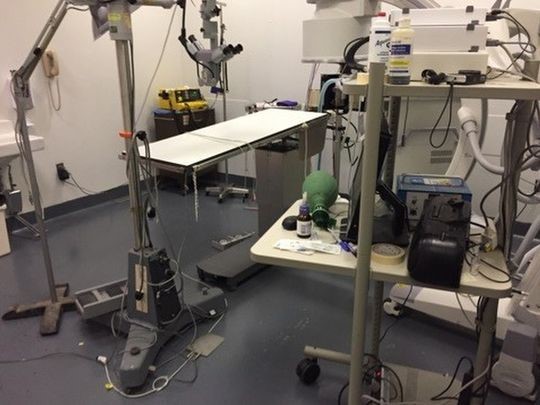The VA’s experiments on dogs which ended in the dogs being killed has resulted in more scrutiny from Congress and enhanced oversight.
Recently, an investigation was made into the deaths of dogs being experimented on by the Department of Veterans Affairs.
The VA performs controversial experiments on dogs at a facility in Virginia, and recent revelations into their practices are making Congress consider defunding the experiments altogether.
These tests involve pain for the animals, and though this investigation is helping with the regulations, the testing itself is not scheduled to stop at this time.
What Happened and What Will Follow
3 VA facilities across the U.S. conduct invasive experimentation on dogs. Procedures include surgeries on the dogs’ hearts, spines and brains. 300 dogs are slated to be experimented on; most are Beagles, and many are only 6-months old. All of them are scheduled to be killed upon completion of the research.
So what’s changing?
From now on, all research on dogs will have to be approved by top VA veterinary officials, and the experiments will have to undergo more rigorous scientific reviews ahead of time.
What spawned all this to begin with?
In May, an investigation into the VA’s Office of Research Oversight was conducted. This research concluded that the VA failed to adequately document whether or not the dogs had been properly treated. Four dogs were found to be suffering from complications caused by the experimentation.
Because of this, Capitol Hill put forth effort to stop VA dog experiments which would be painful for dogs. In July, the House cut funding for this research. Now, the VA is pushing back by requesting assistance from entities like veterans groups by asking them to persuade senators to not back this measure.
The VA argues that cutting funding for these experiments will halt important medical advancements, and that this will negatively impact disabled veterans by depriving them of better medical options for their afflictions.

According to the VA, this research has led to breakthroughs such as cardiac pacemaker implants and an artificial pancreas created for diabetics.
But according to opponents, these breakthroughs are actually decades old, and most of this research never makes its way to human uses. Opponents claim that the VA relies on outdated models which ignore more modern scientific advancements which would help get away from experimenting on dogs altogether.
Justin Goodman is the Vice President of the White Coat Waste Project, an advocacy group that fights to end tax-payer funded animal experimentation in the U.S. According to Goodman, researchers made these same claims about needing to experiment on chimpanzees, until a federal study deemed this practice unnecessary and cut funding for chimp research in 2015.
Details of Current Experiments
The studies which would be affected by this proposed legislation are those involving pain for the dogs, including administering medication to relieve the pain.
In Milwaukee, researchers are trying to find a way to administer medication which decreases pain without slowing down breathing. They are using dogs to study the neurons that control the breathing.
This involves placing dogs under anesthesia and removing the parts of their brains, effectively causing a complete loss of consciousness and all sensation. After that, they perform tests on the neurons of the dogs’ brain stems before administering lethal injections to kill the dogs to end the surgery.
Disturbingly, the study protocol called for only adult dogs in the experimentation, but somehow the VA managed to use puppies aged 6-9 months for their research. VA officials reported that the term “adult” was being deleted from the protocol.
In Cleveland, experimenters are trying to find ways to restore cough function after spinal cord injury. Their tests involve putting dogs under anesthesia and using electrodes to induce coughing in dogs before and after severing the spinal cords of dogs to mimic injuries incurred by humans.

This research calls for 41 dogs, all of which will be euthanized at the end without being allowed to wake up from the anesthesia. Researchers defend this shocking practice by claiming that past similar studies helped them improve the breathing of quadriplegics relying on ventilators.
And in Richmond, researchers are implanting pacemakers into dogs, making them run on treadmills, and performing various tests. Tests include medication injection, forcing irregular heartbeats, creating heart attacks, and blocking arteries. When the research is done, dogs are either killed by lethal injection, or by having their blood drained.
The Ethics of These Experiments Get Questioned
After a complaint was filed with the VA inspector general’s office in March, an investigation was conducted looking at the the Richmond cardiac experiments.
The investigation revealed disturbing facts, including the following:
- One dog received an overdose of anesthetic during surgery, but recovered.
- 2 dogs were afflicted with surgical disruption of the nerves in their digestive tracts, which resulted in nausea, lethargy, anorexia, and weight loss.
- 1 dog died as a result of ventricular fibrillation
- 1 dog was euthanized during subsequent surgeries after initial experimentation.
- 1 dog died after the surgeon accidentally sliced into its lung during surgery.
- Approved study procedures were shown to be deviated from.
- There was inadequate documentation to prove that dogs received proper treatment.
As a result of this investigation, the VA actually banned the researcher who did these surgeries from ever being able to perform future operations or have any say in study protocols.
Why Are Dogs Being Used for These Experiments?
In an era and a country where dogs are viewed as beloved companions, why are we using them to experiment on in such heartless ways?
RELATED: PAWSitiveFX is Helping in the Fight Against Animal Cruelty
The VA claims that dogs have a heartbeat pacing system which is more similar to that of humans than other animals have.
The VA also claims that dogs are easily trainable for some of the activities researchers need to observe, and that the dogs actually enjoy it.
According to the VA, dogs account for less than 1% of all animals used in agency research. They claim that almost 100% of the animals used in their experiments are mice or rats.
Supporters of this research worry about the effect that might result from this recent controversy. If the government bans research on dogs in the VA, medical researchers worry that this will lead to research being banned on dogs everywhere in the U.S.
Dog testing happens more places than just at the VA facilities. In the U.S. last year, approximately 60,000 dogs were used in experiments. This number is lower than it was in previous decades.
Supporters maintain that dogs are critical to medical research, and that everyone including dogs will benefit from continued experimentation on them.
Opponents say that science cannot be left unchecked to justify using cruel methods without accountability for their actions.
And not all VA members support this research.
In a letter to the Editor of USA Today, retired rear admiral of the U.S. Navy Medical Corps Marion J. Balsam, M.D expressed concern over support for the continued research, and voiced his opposition to the practice. According to Balsam, this research is slow and expensive, and rarely has applications for humans.
He cited documents put forth by the British Medical Journal which prove that this practice amounts to billions of wasted tax dollars every year.
Balsam says that the way of the past does not have to be the way of the future, and that non-animal research has proven very advantageous. He says more efficient and humane research technology exists, and that the VA should use these technologies instead of using dogs.
So, where do you stand on this issue? Do you think performing experiments on dogs is justified in the name of medical progress for humans? Do you think testing on dogs is never okay? How about non-dog animals?
To voice your opinion to Congress in opposition to this research, visit this page.
READ NEXT: 17 Tax Deductions for Dog Owners













